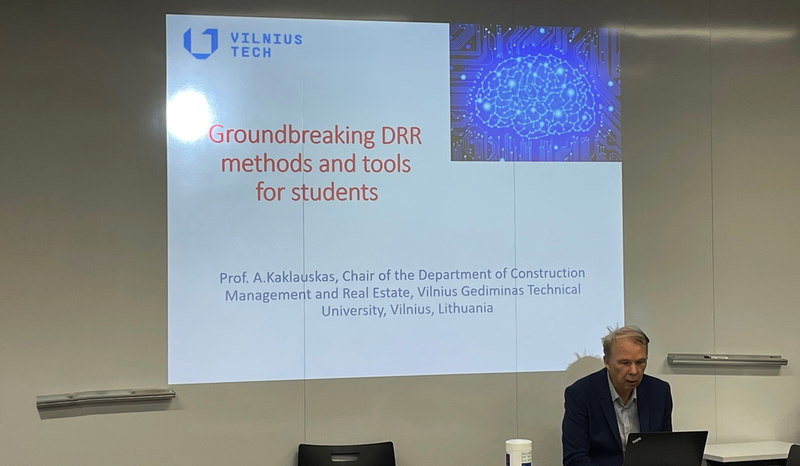Home
For international students
VILNIUS TECH representatives participated in the meeting of the INCLUDE project
- Programmes in English 2025/2026
- Admission 2025/2026 Scholarships
- For exchange students
- Free Movers
- Transfer studies
- Erasmus+ studies and traineeships
- Mentor programme
- Student testimonials
- Accommodation
- Career Services
- Medical Care
- Immigration Regulations
- Leisure and Student Activities
- Useful information
- VILNIUS TECH for Creators of Tomorrow
- Mental and spiritual support
- Representatives Abroad
- Contacts
- Computer Engineering

2022-12-02
VILNIUS TECH representatives participated in the meeting of the INCLUDE project
INCLUDE (INCLUsive Disaster Education) is a collaborative research project co-funded by EU Erasmus+ programme. This two-year research initiative aims to reimagine online distance learning education so that it better supports the diverse Disaster Risk Reduction (DRR) community.
The project aims to reimagine online distance learning education so that it better supports the diverse DRR community and the following objectives have been set out:
• To understand online, distance learning strategies currently used in DRR education and their effectiveness, by taking into consideration in promoting gender equality and sensitivity and also in addressing differences in relation to the access and use by underrepresented groups;
• To develop a framework to reimagine online distance learning education so that it better supports the diverse DRR community, also in addressing both natural and biological hazards and their integration;
• To design an innovative University-Industry digital learning platform to provide high quality inclusive digital education to DRR community;
• To explore the opportunities of the use of disruptive technologies in online distance learning education in DRR;
• To propose a digital competence framework for educators in building capacity to implement online and distance teaching and learning in DRR.
November 30-December 1 a meeting of project participants took place at Keio University in Japan. During the meeting, the further work project of the project participants was discussed, and the results already achieved were presented. Each participating project institution presented the results of its work and the dissemination of information about the project. A workshop was held for all project participants and stakeholders.
INCLUDE VILNIUS TECH coordinator prof. habil. dr. Arturas Kaklauskas and the participant assoc.prof.dr. Natalija Lepkova presented the report of interviewed experts and students on the aspects of disaster risk reduction (DRR) education.
INCLUDE VILNIUS TECH coordinator prof. habil. dr. Arturas Kaklauskas made the presentation on innovative disaster risk reduction (DRR) approach and tools for students, teachers, teaching and assessment. The concepts of smart university, smart study infrastructure, smart classroom, micro-learning using modern technologies and concepts such as: Industry 5.0, Society 5.0, Study 5.0, blockchain, IoT, augmented and virtual reality, cognitive and emotional computing, digital twin, robotics, games, text analytics technology, and more were presented. Analogous smart study technologies developed by VILNIUS TECH were demonstrated.
Project coordinator: The University of Huddersfield (HUD), UK.
Project partners: University of Central Lancashire (UCLan), UK; Lund University, Sweden; Vilnius Gediminas technical university (VILNIUS TECH), Lithuania; Keio University, Japan.
INCLUDE VILNIUS TECH coordinator prof. habil. dr. Arturas Kaklauskas.
More information about the project can be found here.

The project aims to reimagine online distance learning education so that it better supports the diverse DRR community and the following objectives have been set out:
• To understand online, distance learning strategies currently used in DRR education and their effectiveness, by taking into consideration in promoting gender equality and sensitivity and also in addressing differences in relation to the access and use by underrepresented groups;
• To develop a framework to reimagine online distance learning education so that it better supports the diverse DRR community, also in addressing both natural and biological hazards and their integration;
• To design an innovative University-Industry digital learning platform to provide high quality inclusive digital education to DRR community;
• To explore the opportunities of the use of disruptive technologies in online distance learning education in DRR;
• To propose a digital competence framework for educators in building capacity to implement online and distance teaching and learning in DRR.
November 30-December 1 a meeting of project participants took place at Keio University in Japan. During the meeting, the further work project of the project participants was discussed, and the results already achieved were presented. Each participating project institution presented the results of its work and the dissemination of information about the project. A workshop was held for all project participants and stakeholders.
INCLUDE VILNIUS TECH coordinator prof. habil. dr. Arturas Kaklauskas and the participant assoc.prof.dr. Natalija Lepkova presented the report of interviewed experts and students on the aspects of disaster risk reduction (DRR) education.
INCLUDE VILNIUS TECH coordinator prof. habil. dr. Arturas Kaklauskas made the presentation on innovative disaster risk reduction (DRR) approach and tools for students, teachers, teaching and assessment. The concepts of smart university, smart study infrastructure, smart classroom, micro-learning using modern technologies and concepts such as: Industry 5.0, Society 5.0, Study 5.0, blockchain, IoT, augmented and virtual reality, cognitive and emotional computing, digital twin, robotics, games, text analytics technology, and more were presented. Analogous smart study technologies developed by VILNIUS TECH were demonstrated.
Project coordinator: The University of Huddersfield (HUD), UK.
Project partners: University of Central Lancashire (UCLan), UK; Lund University, Sweden; Vilnius Gediminas technical university (VILNIUS TECH), Lithuania; Keio University, Japan.
INCLUDE VILNIUS TECH coordinator prof. habil. dr. Arturas Kaklauskas.
More information about the project can be found here.












